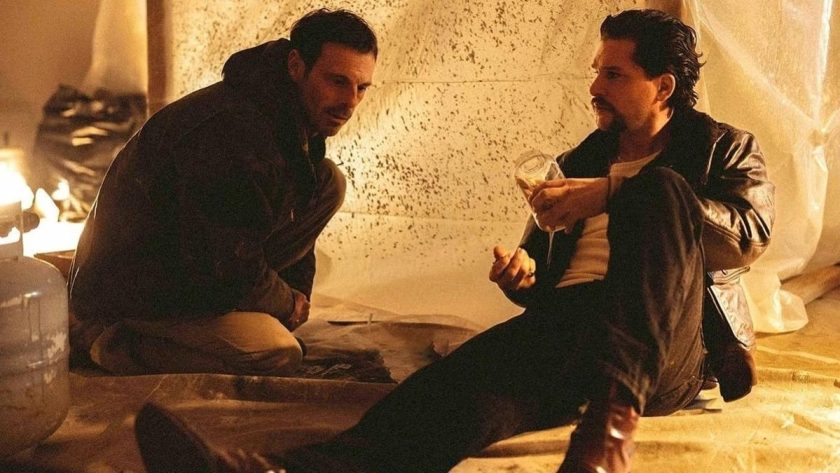Aarya Shah reviews this cautionary tale of morality being driven out by greed and despair.
Blood For Dust begins with a gunshot followed by a blood splatter. While this is symbolic of the action-packed 104 minutes that follow, it is also probably the most significant frame of the film. Almost every action of Cliff (Scoot McNairy) is driven by what transpired in that opening shot.
In this film, Rod Blackhurst presents a very fresh rendition of a familiar tale. We have seen the story of the morality of good people being driven out by desperation and circumstance multiple times before, yet he reinvents this template with a fascinating twist: the protagonist isn’t as clean. Somewhere beneath the monotonous life he is leading, there is a dark past lurking, forever threatening to catch up with him. Blood For Dust takes its time to get going, but a lot of that feels intentional. Blackhurst wants us to experience the pall of gloom and despair that always seems to be hanging over Cliff. He wants us to feel suffocated by the tediousness of Cliff’s life as a salesman selling defibrillators. To convey the dreariness, he makes terrific use of the background score (another recently released film which made effective use of the background score was David Fincher’s The Killer) – probably the best I have seen in a thriller in years.
The loop of monotony Cliff seems to be facing is only broken by Kit Harington’s entry into the film. His character, Ricky, enters the strip club with a rather heavy Western accent, a wry sense of humour and an unconventional plan to help Cliff earn loads of money to provide for his family. It’s impossible to not succumb to his inimitable charm and Cliff eventually gives in to the demon of desperation, not knowing where this will lead him.
What follows is a truly engrossing character study in the guise of a fast-paced thriller. Scoot McNairy brings a sense of raw vulnerability to Cliff that makes us root for him not out of admiration, but merely out of sympathy. Rod Blackhurst mentioned that the story was written by them in the Trump era. A time when people were driven to commit heinous crimes, believing that they had been left behind by others who got ahead in life because of their impunity without facing any repercussions for their actions. The film was meant to be a cautionary tale of how a momentary lapse in judgement can leave you covering your tracks for the rest of your life because your past deeds will inevitably catch up with you. The film leaves you with a deeper understanding of the complexity of male friendships, like the one Cliff and Ricky shared. A bond that was transactional by nature but also heavily dependent on mutual trust.
However, for me, the main character of this film was undoubtedly Montana, the place where the film was shot. Justin Derry does a stupendous job covering the grandeur of the snowy landscape. The beauty of the landscape serves to accentuate the dread felt by the audience. The cinematography of the film was strongly reminiscent of some of my favourite thrillers (incidentally all involved shooting in snow!) like Fargo, Wind River and even Christopher Nolan’s Insomnia to an extent. The location scouting was done by a sixth generation 26 year-old resident of Montana and the meticulousness of the selection is visible in every frame. The film would probably be not even half as engaging as it was if it weren’t for the cinematography.
There are a few gripes I had with the film. For a film that has major progression in the plot with every scene, it should have been slightly better-paced. There were a few scenes in the second act which should have been far more engaging. I also have mixed feelings about Kit Harington’s performance as Ricky. While I get that his character was meant to be an exaggerated, trigger-happy counterfoil to the authenticity and rawness of Cliff, there were multiple times the character breached the fine line between exaggeration and caricature. Unnecessary maniacal laughter is a prime example of what should have been avoided because the character was evidently a maniac and he didn’t need these off putting mannerisms to prove it. While I think Kit still did a fine job interpreting a not-so-well-written character, his Western accent did leave a lot to be desired.
However, these flaws shouldn’t distract you from the fact that Blood For Dust is an exquisitely shot reinvention of a familiar tale of the corruptibility of man. Rod Blackhurst is an exciting voice in indie cinema for his ability to tell stories convincingly while not flinching from showcasing the brutality of the character’s circumstances Getting a technically sound and engaging thriller is rare in times where we so often sacrifice quality at the altar of grandeur, but Blood For Dust somehow succeeds in being both, which is a pretty remarkable feat.




